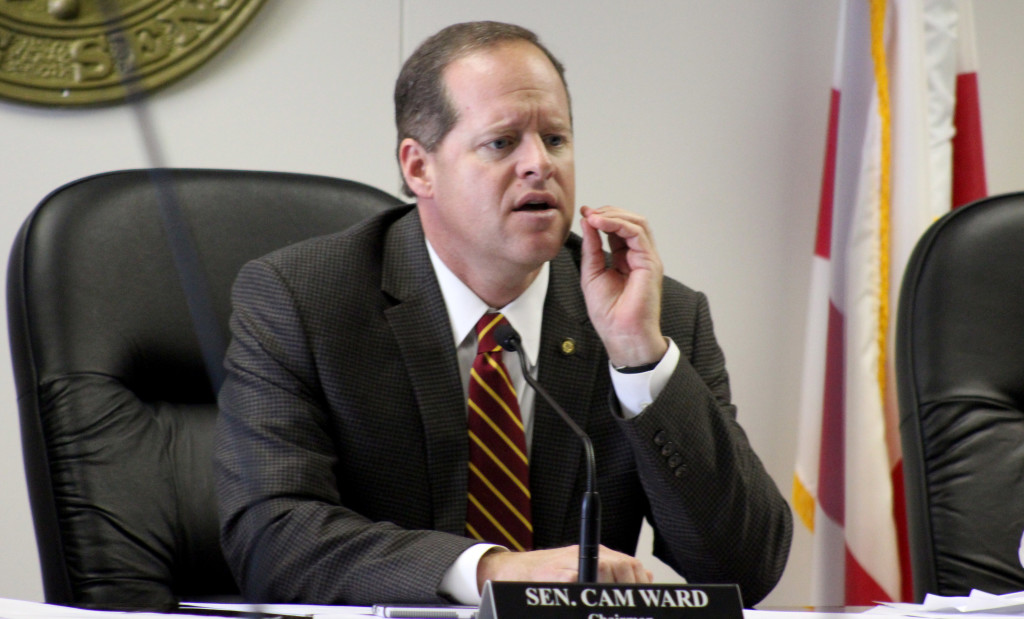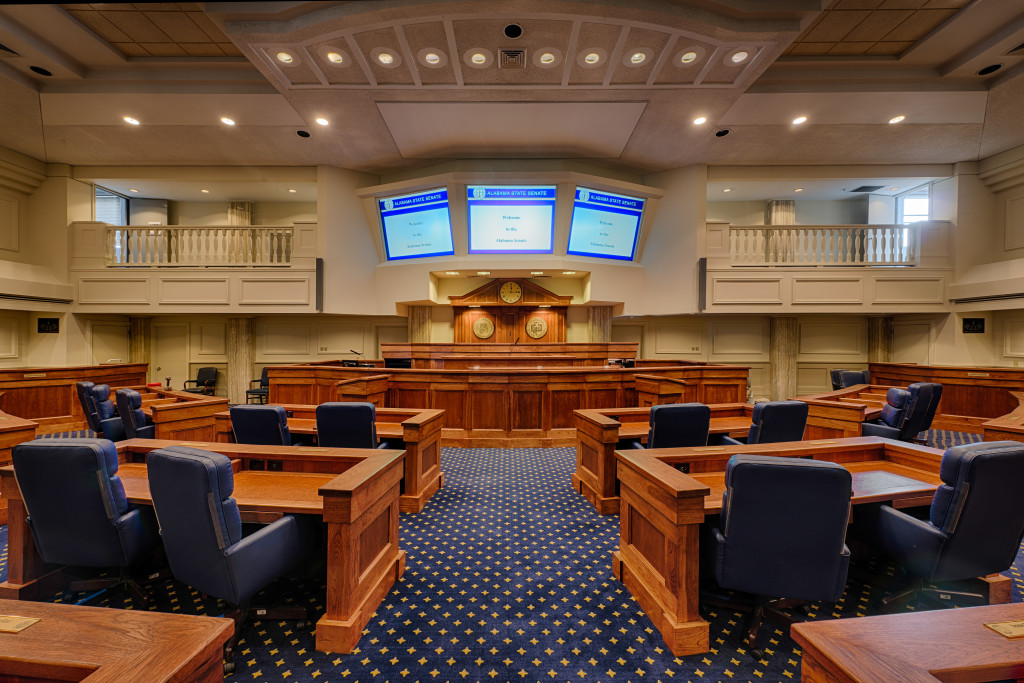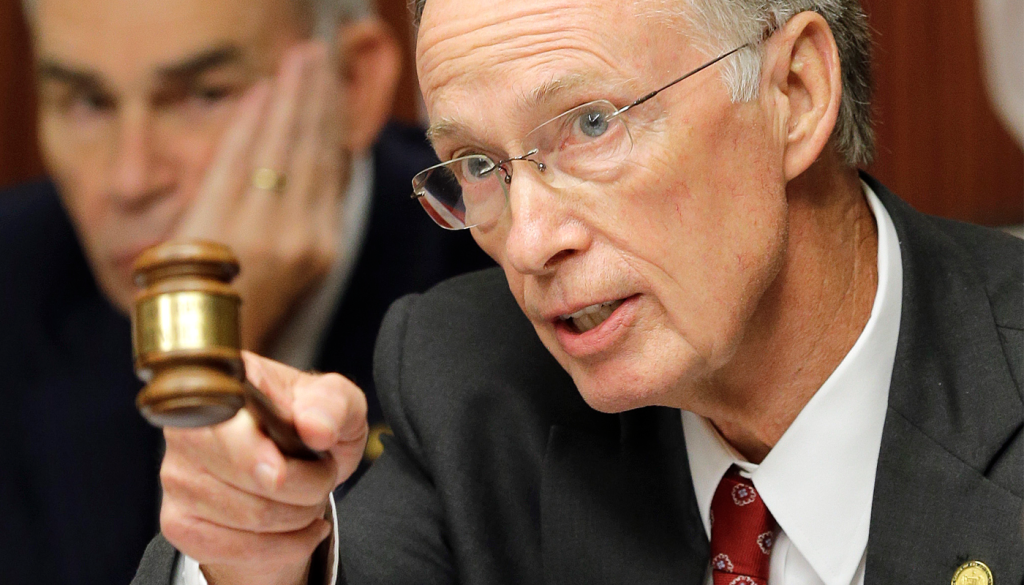Senate committee hears arguments over decriminalization of cannabis oil

The Senate Judiciary Committee met Wednesday in a room filled to the brim with desperate families and ailing children. The contingent was on hand to hear the committee discuss SB115 from Sen. Paul Sanford (R-Huntsville), which would decriminalize possession of the seizure-reducing drug cannabidiol (CBD). The bill is the Senate version of HB61 from Rep. Mike Ball. Ball brought forth the legislation, also known as “Leni’s Law,” after the previously passed “Carly’s Law” left many needy children out of the CBD studies. Ball’s legislation is named for Leni Young, a 4-year-old Alabama girl whose family was forced to move to Oregon to gain access to the medicine after she was excluded from the CBD study. According to Amy Young, Leni’s mother, access to the marijuana-derived medication has allowed Leni to improve by leaps and bounds. The little girl is now verbal and able to sit on her own, two things she was not able to do before moving across the country. Ten minutes after the meeting was set to begin, the contingent was told to move to the seventh floor. Sanford introduced the legislation, referencing Leni and the failures of “Carly’s Law” to include more families. “Basically, an Alabama family has turned into refugees,” Sanford said. “I believe government is basically standing in the way right now.” Sanford said the new law would provided families with an “affirmative defense” against prosecution for possession of the medicinal oil. “These parents are not criminals,” Sanford said. “They’re trying to help their children.” Despite a public hearing being scheduled and there being no plans for a vote on the bill, Sen. Bobby Singleton (D-Greensboro) immediately called for a vote on the legislation. “We’re talking about the lives of children,” Singleton said, noting his disdain for opponents of the measure. “I think we need to go and vote on this bill and get it out of committee and give these children what they need.” Committee chairman Sen. Cam Ward (R-Alabaster) noted Singleton’s suggestion, but added that each side has a right to plead its case. One of the opponents was Dr. Roxanne Travelute, president of the Jefferson County Medical Society. Travelute contended that the bill’s allowance of CBD oil containing as much as 3-percent THC, the psychoactive chemical in marijuana, would cause addiction and neurological disorders, as well as widespread use for illnesses the drug was not designed to treat. Another opponent was Dr. Shannon Murphy, speaking on behalf of the American Academy of Pediatrics (AAP), who opposed the bill on the basis that CBD oil attained by parents may not be safe for patients. “We all sympathize greatly with these families,” Murphy said. “But as physicians, our Hippocratic Oath requires that we first do no harm.” Dr. Gina Dawson spoke in favor of the bill, saying that many of the claims made by opponents are patently false. Dawson noted that the AAP opposes legalization but has said exceptions should be made for “compassionate use.” She cited drugabuse.gov, which says that abuse of CBD oil is almost nonexistent, and remarked that the Epilepsy Foundation has called for legislation providing access to CBD oil to be passed. Dawson also noted that CBD oil is expensive and has no street value. Parents would willingly be on the hook for the cost of the medicine, but drug dealers would not be interested in a high-cost, low-potency drug for sale on the black market. Another proponent, Joe Church, noted that the ingredients in Tylenol or Ibuprofen are more dangerous than CBD oil, as are the mind-numbing drugs these children must take every day. He also alleged that much of the opposition to Leni’s Law comes from GW Pharmaceuticals, which has $1.1 billion invested in its stranglehold over the manufacturing of the oil. The committee is scheduled to take the legislation up again after spring break.
Proposal circulating in Montgomery would close state primary elections

While Alabamians have already voted in the this year’s Presidential Preference Primaries, that hasn’t ended the conversation in 2016 about the state’s elections. A plan circulating in the Legislature would make Alabama one of 31 states who allow only registered Republicans and Democrats to vote in their respective primaries. SB 360 by Sen. Tom Whatley would close Alabama primaries; mandate a voter be registered with their party at least 14 days before voting in a primary; and prevent voters from switching parties in between a primary and primary run-off. Currently Alabama – like Deep South neighbors Tennessee, Georgia, and Mississippi – has open primaries. Some observers have said open primaries leading to voters casting “strategic” ballots, seeking to influence the outcome of a party they do not identify with. Alabama gave 44 of its 55 Democratic delegates to former Secretary of State Hillary Clinton while Vermont Sen. Bernie Sanders received nine during March 1 elections, as part of the newly-established “SEC Primary,” which saw Donald Trump took the lion’s share of Republican delegates, winning 36 out of 50. Texas Sen. Ted Cruz was awarded 13 delegates while Florida Sen. Marco Rubio managed to snag one. Trump and Sanders have both done better in open-primary states than those with traditional closed primaries and caucuses. SB 360 is co-sponsored by Sen. Cam Ward and Sen. Trip Pittman. Anonymous sources told Alabama Today on Thursday there is “much GOP support for this proposed legislation.”
Senate committee greenlights Ten Commandments for display on school, state property

With little discussion, the Senate Judiciary Committee gave a favorable report to SB97 from Sen. Gerald Dial (R-Lineville) allowing the Ten Commandments to be displayed on state property and at public schools. Committee chairman Sen. Cam Ward (R-Alabaster) noted that the bill has passed out of committee several times over the years and always stalls in one of the legislative bodies. Sen. Linda Coleman-Madison (D-Fairfield) lodged the only opposition to the bill. “Whatever happened to the separation of church and state?” she questioned. Despite the limited opposition, the bill was OK’d within seconds of being brought up.
Prison reform bill passes committee, moves forward to full Senate

On Wednesday, the Senate Committee on General Fund Taxation and Finance passed the long-debated Alabama Prison Transformation Initiative Act, clearing its path to go before the full Senate next week. SB287 from Sen. Trip Pittman (R-Daphne) provides an $800 million revenue bond for the demolition of 14 of Alabama’s 16 prisons and subsequent renovation of the remaining two. The bill further provides for the construction of four new prisons, three male and one female, which will pay off the bond through perceived savings. As collateral, the bill provides a 1-mill tax currently reserved for funding the Alabama Department of Human Resources (ADHR) and the Alabama Department of Veterans Affairs (ADVA). Proponents say that the tax would only be used if the Alabama Department of Corrections (ADOC) defaults on its bond payments, which is not expected to happen. In previous committee meetings, opponents spoke out against the 1-mill tax commitment as well as the design/build method laid out in the bill, which state contractors have argued would stifle competition and have a negative effect on local companies. With the 1-mill tax concerns in mind, Sen. William Holtzclaw (R-Madison) offered an amendment which would protect the ADVA and ADHR. If forced to use the money because of an ADOC default, money would taken from each agency incrementally and, if funding became unsustainable, future legislatures would be forced to fully fund both departments. The amendment further imposes a sunset on the 1-mill tax commitment to alleviate concerns that it could be on the table for many years to come. The amendment was unanimously approved, with only Pittman abstaining from the vote. In regard to the design/build method, which repeatedly drew the ire of state engineers and architects, Pittman alleged that altering that language would be a nonstarter for Gov. Robert Bentley, who contends that the method is best for the state and the project. State Finance Director Bill Newton noted that design/build would shorten the time of construction by one year and save the state about $100 million. Many committee members spoke favorably of the legislation, despite the longstanding uproar and inner-concerns over the bill. “Don’t let this die in committee today and we lose the only vehicle we have for improving those facilities,” said Sen. Cam Ward (R-Alabaster). “That would be a terrible, terrible shame for all of us.” “If this is the only way we can make things better then we ought to do it,” said Sen. Priscilla Dunn (D-Bessemer). “I think it’s time that we try to do something about it. We need to do something about these prisons.” In the end, only Sen. Paul Sanford (R-Huntsville) voted against the bill.
Senate Rules panel quickly moves array of bills to Special Order Calendar

In a meeting that lasted less than 10 minutes, the Senate Rules Committee approved a number of bills for addition to the Special Order Calendar. Unlike other committees, the Rules Committee does not give favorable or unfavorable reports. It simply approves or disapproves of bills slated to be added to the daily calendar of bills headed for their respective bodies. With little discussion, the committee approved the entire slate of legislation that included 20 bills. Among those approved for a move before the full Senate was SB136 from Sen. Vivian Figures (D-Mobile), which would raise money for Medicaid via a 5-mill increase in the state’s low property tax. Figures noted in an earlier committee meeting that the move would net about $280 million by 2019 and every year thereafter. The committee also approved SB268 from Sen. Cam Ward (R-Alabaster), which would revoke the Medicaid benefits of city and county jail inmates while incarcerated. SB285 from Sen. Arthur Orr (R-Decatur) was also approved by the committee. Orr’s bill would put further restrictions on public assistance programs, such as Supplemental Nutrition Assistance Program (SNAP) and Temporary Assistance for Needy Families (TANF) benefits. The bill specifies that SNAP benefits should be terminated if a recipient is late on child support or any “court-ordered support payments.” The bill would also put a lifetime limit of 36 months on TANF benefits and require the Medicaid Agency to better track the income and assets of benefit recipients. Further, the bill would require out-of-state purchases with TANF money to be tracked and a person’s citizenship to be questioned if too many such purchases are made. The committee also approved the Unborn Infants Dignity of Life Act, HB45 from Rep. April Weaver (R-Alabaster), which provides for the “dignified final disposition of the bodily remains” of infants and prohibits the already-illegal sale of fetal tissue. Weaver’s bill has already cleared the House and its addition to the Senate calendar poises it to approach final passage.
Trespassing in Alabama could soon cost you up to $6,000, one year in prison

The Alabama Senate passed legislation Thursday which will increase penalties for “criminal trespass of critical infrastructure,” thereby better protecting Alabama businesses. “Critical infrastructure” references such establishments as chemical manufacturing facilities, electrical tower substations, railroad switching yards, trucking terminals and water treatment facilities. SB217 from Sen. Cam Ward (R-Alabaster) would increase penalties for such crimes to a Class A misdemeanor, which carries a fine of up to $6,000 and a possible sentence of one year in prison. Previously, crimes of this nature were considered only a criminal violation, punishable by up to 30 days in jail and a $200 fine. “These are extremely sensitive business sites that often contain dangerous chemicals or support our utility infrastructure,” Ward said in the release. “Criminal trespass of these sites puts the public at risk and represents a huge loss in annual revenue to Alabama’s businesses and consumers.” “We applaud Senator Ward’s leadership in championing this important piece of legislation protecting Alabama’s manufactures and their partners,” stated George Clark, President of Manufacture Alabama. “Ensuring the safety and security of our state’s vital industries allow them to build their businesses and grow Alabama’s economy.” With its passage in the Senate, the bill is cleared to go before a House committee before going to the full House of Representatives.
Cam Ward: Un-earmarking is a common-sense solution to budget issues

Budget cuts. Tax increases. Agency restructurings. We’ve heard and seen it all over the past several months since the Legislature first came to order in early March. Since that time, there has been a regular session and two special sessions. Throughout each, a lot of ideas were bounced off the wall – some stuck, some got shot down, and some still have legs. State senators and representatives came forward with ways they thought the $200 million hole in the General Fund budget should be filled. On one side you had those who believed government services should be unilaterally slashed without regard to the impact on our citizens. On the other side was Governor Bentley with a $541 million tax increase that also gave equal disregard to the impact on Alabamians. Most legislators, including myself, believed a more responsible solution was a mix of targeted cuts to state agencies, small revenue increases, and continued reform of high cost state services, like Medicaid and prisons. This was the budget solution ultimately passed the Legislature and was signed by Governor Bentley in September. Most state agencies were asked to make cuts ranging from 1% to 5%. A $0.25 increase in the cigarette tax was passed to fund the exploding cost of Medicaid, while reforms to our state prison system and Medicaid will save taxpayers hundreds of millions of dollars over the coming years. Yet, there are still grave fiscal challenges ahead for Alabama. The growing number of senior citizens in our state means the cost of the Medicaid program will continue to rise over the coming decade. Even now, Medicaid consumes 37% of the state’s General Fund budget, which funds all non-education expenses. For Alabama to thrive in the coming decade, the Legislature must have flexibility to allocate state tax dollars in the most efficient manner possible. Currently, 91% of Alabama’s tax dollars are earmarked for specific departments or programs. Alabama has the highest percentage of earmarked revenue in the nation, and the next highest is Michigan with only 63%. The national average is just 24%. That means Alabama has nearly four-times the earmarks of the average state. Earmarking leads to apathy in state government since state agencies are assured specific sources of funding, and there isn’t incentive to show they are using current funds efficiently. Bureaucrats can rest easy in the knowledge that a stream of taxpayer dollars is earmarked just for their programs. I believe government can and does provide essential functions for our citizens. But there should pressure on the agencies each year to become as efficient as possible, in order that you, the taxpayer, can keep more of your hard-earned income. That is why I have authored a bill that will significantly reduce the number of earmarks in the state budget. Under this legislation, more than $450 million in state revenue will be un-earmarked. It represents about 15 percent of the total earmarked state General Fund dollars, leaving protected the funds that draw down federal matches or fund critical services. Just as a business or family must have some flexibility in yearly budgeting to respond to changing priorities, the Legislature needs the ability to move resources to meet changing needs for our state. Both excessive debt and high levels of taxation will mire an economy in sluggish growth. Republicans in the Legislature have stood firm against the Governor’s calls for massive, broad-based tax hikes. Yet, the challenge of fully funding essential programs like Pre-K for our children and Medicaid for the elderly can only be met if the Legislature has the flexibility to move funds on an as-needed basis. Un-earmarking state revenue to create more flexibility is the crucial next step to ensure we deliver a sound financial future to our children and grandchildren. We have seen the dire consequences of debt and high tax rates in countries like Greece, states like Illinois, and cities like Detroit. For Alabama to continue to afford the low tax rates we enjoy, the Legislature needs additional flexibility to more smartly allocate existing resources. That’s exactly why we need this un-earmarking bill to pass in the 2016 legislative session. Republican Senator Cam Ward represents District 14 in the Alabama State Senate, which includes all or parts of Shelby, Bibb, Chilton, Hale, and Jefferson Counties. He serves as Chairman of the Senate Judiciary Committee.
Alabama Grocers celebrates 25 years, names annual award recipients

The Alabama Grocers Association held a celebration Wednesday in Birmingham to honor the year’s top Vendor, Retailer and Wholesaler of the Year Award Winners, as well as mark their 25th year advocating for the priorities of the state’s grocery retailers, manufacturers, brokers and wholesalers. State Rep. Lynn Greer and state Sen. Cam Ward were on hand for the annual fete held at The Club in downtown Birmingham, as was Deputy Director of the state’s Legislative Fiscal Office Mr. Kirk Fulford. The three participated in a legislative panel where they discussed the 2016 budget situation and some of the AGA’s policy priorities. The group, known as “the voice” of Alabama grocers, also gave awards to top-voted members in categories that represent the three legs of the grocery industry. The group named its Vendor of the Year Bob Crawford, President of United-Johnson Brothers of Alabama. Retailer of the Year was Mr. Chris Litz, Regional Director, West Region, Publix Super Markets. And David Bullard, President and CEO of Piggly Wiggly Alabama Distributing Company, took home the Wholesaler of the Year Award. The AGA claims some 135 retail members operating nearly 1,000 stores nationwide, as well as over 225 manufacturers, brokers, wholesalers and other members. According to the group, grocery stores generate over $3.6 billion in annual sales, employ 25,000 Alabamians jobs earning over $750 million in annual wages, andl pay in excess of $300 million in state and local taxes per year.
Alabama judiciary panel chairman has no plans to quit after arrest

The chairman of the Alabama Senate’s Judiciary Committee said drinking and driving was a “huge mistake” but he doesn’t think he should resign after his arrest on a drunken-driving charge. Republican state Sen. Cam Ward of Alabaster told WIAT-TV in an interview aired late Monday that he was using alcohol as a crutch to deal with stress, and driving while doing so was a “whopper” of a mistake. But Ward said he doesn’t believe he should quit either his Senate seat or his industrial development job with the city of Alabaster. “I think I have a lot to contribute in the Senate,” said Ward, 44. Ward said he wasn’t working at the time he was stopped. Senate President Pro Tem Del Marsh previously said he had no plans to remove Ward as chairman of the Judiciary Committee, which handles bills related to legal issues, including prison reform legislation approved in the last session. Ward was stopped by Alabaster police about midday July 1. The arrest occurred about two hours after Ward posted a photo of himself on social media visiting a Bibb County vocational school, and Ward said in the interview he was driving home from Bibb County when he was stopped. Ward, who is awaiting an Aug. 12 court date, did not say in the interview whether he would plead guilty to the charge, which is a misdemeanor. But he acknowledged drinking alcohol and driving. “Obviously, I made a huge mistake. I drank alcohol while driving an automobile,” Ward said. He said his action that day “wasn’t a repeated problem.” Ward said he supports the enforcement of strong DUI laws for himself or anyone else. He said he has sought and received help since his arrest but didn’t specify what type. Republished with permission of The Associated Press.
Robert Bentley testifies before Congress on Alabama prison reforms

Gov. Robert Bentley on Tuesday testified before a U.S. House panel on the topic of recent reforms in the Alabama statehouse designed to limit long prison sentences for nonviolent offenders and increase inmate rehabilitation efforts, to reduce rates of recidivism and the high cost of housing the state’s incarcerated population. In a statement shortly after a hearing of the House Oversight and Government Reform Committee, Bentley touted Alabama’s reforms as a model for the nation. “Prison reform is an important issue in Alabama,” Bentley said. “Alabama has made significant progress over the last year to improve our criminal justice system, ease some of the challenges in our prison system and maximize the amount of state dollars we spend for the Alabama Department of Corrections. “I believe that our prison reform efforts have created a healthy foundation that can, over time, transform the landscape of the entire criminal justice system for the better.” Alabama, in turn, is following suit on a larger national push for “smart justice,” involving changes to federal sentencing guidelines, a move away from mandatory minimums to give more discretion to judges and focusing on giving former inmates viable alternatives away from criminal activity. Bentley praised congressional leaders for opening its doors to state leaders like him, invoking the old saw about states being the “laboratories of democracy.” “States can be laboratories of changes, creating unique opportunities that can address problems. I believe that Alabama is a national model for prison reform, and it was an honor to share our efforts with Congress,” Bentley said in a prepared statement. The move comes just a day after legislative leaders in Arizona called on Alabama Rep. Mike Jones for counsel on the changes he helped institute along with Sen. Cam Ward during the regular Legislative Session. Jones said on the occasion of his visit to the Grand Canyon state that he, too, hopes Alabama’s recent amendments to its criminal code can help show a way forward for a nation whose prison system is clogged with nonviolent offenders.
Alabama prison reform counsel sought by Arizona

The architect of the Alabama Legislature’s recent prison reform overhaul, Republican Rep. Mike Jones of Andalusia, was invited by Arizona lawmakers to provide guidance as the Sunbelt state studies a similar slate of proposals. According to a release from the office of House Speaker Mike Hubbard, Jones spoke with Arizona policymakers including Joseph Cuffari, public safety advisor to Arizona Gov. Doug Ducey; Maricopa County Attorney Bill Montgomery; Yavapai County Attorney Sheila Polk; and state Sen. Adam Driggs, among others. The meeting is a sign of policy cooperation between the two conservative-leaning states. Gov. Robert Bentley signed SB 67 mandating the shift of some categories of nonviolent offenders out of the prison system into law in late May. The law also calls for more rehabilitation of inmates and aims to reduce the level of recidivism in Alabama as part of a larger national push for “smart justice,” as opposed to the traditional “tough-on-crime” regime popular until recently. Those policies, including mandatory minimums and longer sentences for possession and distribution of drugs, for instance, have clogged the nation’s prison systems and left millions locked up for years longer than previous practices dictated. The Alabama bill Arizona hopes to model will reduce Alabama’s prison population by some 4,200 inmates over the next five years, according to Sen. Cam Ward, who sponsored the bill in the Senate along as Jones helped maneuver it through the House. It will help shed prisoners from the rolls by a creating new low-level felony classification, Class D, which will apply reduced punishments for some property and drug crimes. The bill will also increase the number of Alabama’s incarcerated who are supervised away from a prison or jail. Experts estimate there are 24,678 inmates being housed in a framework built for 13,318, taxing the existing capacity by nearly double. “This is not the final end result,” Ward said to AL.com on the measure. “This is the first step in a long road we have ahead to fixing our corrections system.” The bill came as violence, including a recent riot at St. Clair Correctional Facility, has gotten the attention of the Alabama public and state government. Lawmakers said their proactive approach will help avoid federal intervention into the matter.
Cam Ward makes statement after DUI arrest

State Sen. Cam Ward was released on $1,000 bail Thursday morning after being arrested for driving under the influence on Wednesday. Ward released this prepared statement: “My failure at dealing with stress led me to make incredibly reckless decisions. I recognize that I used alcohol as a crutch. I was very wrong and deeply apologize to my family, friends and constituents. I plan on seeking professional assistance immediately.” AL.Com reports Ward was arrested by Alabaster police after they received notice of a possible drunken driver at 12:46 p.m. The report quotes Police Chief Curtis Rigney as saying, “As the officer spoke to Mr. Ward, Mr. Ward exhibited signs of intoxication. Mr. Ward was asked to perform several field sobriety tests, which he failed. At that time, Mr. Ward was placed under arrest for suspicion of DUI.” As reported Wednesday night, Ward has received supportive public messages from friends. Those continue to come in. Keep checking back. We will update this post with additional information as it becomes available. Adding to the supportive messages: @brianrell @SenCamWard I echo that — Tom Whatley (@SenTomWhatley) July 2, 2015 @brianrell @SenCamWard We don’t always (or maybe often) see eye to eye but he’s a good person with his heart in the right place. — Lisa Borden (@lisawborden) July 2, 2015


